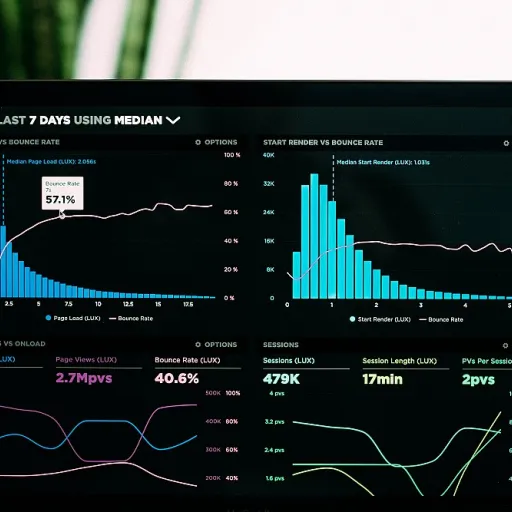
Understanding AI's Role in SEO
The Intersection of Artificial Intelligence and SEO
In the evolving landscape of digital marketing, integrating artificial intelligence into search engine optimization (SEO) has emerged as a transformative approach for tech companies aiming to optimize their market strategy and reach. With AI at the forefront, businesses can now craft content that aligns more closely with their target audience's needs, improving both user engagement and customer satisfaction. This integration provides an edge in tailoring marketing strategies to drive growth and capture a larger market share.
Leveraging AI for Market Insights
AI's role in SEO extends beyond basic keyword analysis, enabling companies to dive deeper into customer data. By harnessing machine learning algorithms, businesses can better understand customer segments, sharpening their focus on potential customers and effectively tailoring their marketing framework. This approach allows for a more precise evaluation of market trends and the buyer journey, supporting an effective marketing strategy.
Enhancing Content Strategies Through AI
AI tools facilitate the creation of predictive content strategies that align with the dynamic nature of customer behavior. By analyzing content performance data, AI helps marketers adjust their content marketing efforts in real time, ensuring continuous engagement and the achievement of business goals. Such adaptability is crucial for long-term success in the fast-paced tech market.
Strengthening the Business Unit with AI
Utilizing AI within business units enhances the framework of B2B tech marketing by allowing for a more granular sizing of market opportunities. AI aids in developing a go-to-market (gtm strategy) that leverages social media and lead generation tools more effectively. This not only helps in targeting potential customers but also in securing a strong position in the competitive tech market.
Building a Corporate and Business Unit Marketing Framework
Creating a Unified Marketing Framework
To effectively leverage AI in SEO, businesses must first establish a comprehensive framework that unifies both corporate and individual business unit strategies. This framework is central to achieving defined marketing goals and ensuring consistent growth and alignment across various departments.
Integrating AI into the Marketing Strategy
Incorporating AI tools into the marketing strategy allows companies to tap into the vast potential of data-driven insights. These insights help refine target audience segmentation, enhancing the ability to reach potential customers more effectively. By analyzing customer behavior patterns and market trends, tech companies can tailor their marketing strategies to specific customer segments, optimizing their growth potential.
Aligning Strategies for Effective Execution
A successful execution of AI-driven SEO requires close alignment between corporate-level objectives and business unit goals. Each unit within an organization must work toward a shared goal to increase market share while maintaining flexibility to adapt to specific market needs. This involves setting clear KPIs that resonate across both the corporate level and individual business units.
Optimizing Content for Target Audiences
Content remains at the core of any effective marketing approach. With AI, companies can enhance content marketing efforts by analyzing what resonates best with different target audiences. The more a business understands the buyer journey and customer expectations, the better it can tailor its content to meet those needs, ultimately leading to increased lead generation and sales.
For a detailed look at how AI can be effectively integrated into marketing frameworks and strategies, ensuring long-term success and adaptability, explore the practical approaches in AI-driven SEO strategies.
AI Tools and Techniques for SEO
Advanced Tools for Market Domination
Artificial intelligence offers an array of sophisticated tools and techniques that tech companies can leverage to optimize their SEO strategies effectively. These AI-powered solutions are central to any business aiming to stay competitive in the contemporary highly dynamic digital market.AI-Driven Content Optimization
AI algorithms are adept at understanding what quality content should look like and how it can resonate with potential customers. By analyzing existing content, these tools help identify gaps and optimize by suggesting keywords, phrases, and even comprehensive content revisions. This process not only enhances the relevance of your content but also aligns it with customer expectations and SEO goals.Leveraging Data for Smarter Insights
Tech companies can harness vast amounts of data, allowing AI tools to identify patterns, trends, and customer behaviors more efficiently. These insights contribute to a more targeted business strategy, as AI tools can accurately segment target audiences and suggest precisely what content will engage them, thus driving higher engagement and conversions.SEO Automation Techniques
Automation is another significant advantage AI brings to search engine optimization. Various platforms offer features like real-time keyword tracking, automated reporting, and continuous optimization of ad placements. This can drastically streamline marketing efforts, making it easier to achieve long-term growth and significant market share.Enhancing Tactical Approaches with AI
AI tools can assist in refining marketing strategies to better align with corporate business units’ distinct objectives. By tailoring approaches based on specific customer segments, businesses can ensure that their message reaches the right audience, enhancing the effectiveness of their go-to-market strategies. For a deeper dive into enhancing your brand visibility and effectively auditing it using large language models, this link provides effective strategies for auditing brand visibility on large language models.Overcoming Challenges in AI-Driven SEO
Key Hurdles in AI-Driven SEO Implementation
AI-driven SEO strategies are revolutionizing the way businesses operate in the digital sphere. Nonetheless, incorporating these advanced techniques presents its own set of challenges that must be addressed to ensure successful outcomes.Data Quality and Integration
In building your marketing strategy, one of the primary challenges lies in the quality and integration of data. Access to reliable, timely data is crucial for AI algorithms to yield accurate and actionable insights. Ensuring seamless data integration across various corporate business units can streamline operations and improve outcomes, offering potential growth for target markets.Algorithm Complexity and Adaptation
Understanding and adapting to the complexities of AI algorithms is another significant challenge in implementing SEO strategies. As algorithms continue to evolve, businesses must stay abreast of the latest changes to maintain a competitive edge. This requires adopting a flexible framework tailored to meet the specific demands of each business unit, thereby enhancing their market strategy.Aligning with Business Goals
Aligning AI-driven SEO efforts with broader business goals is essential for achieving long-term success. Companies must clearly define their objectives and strategize accordingly to ensure these efforts integrate well with existing marketing strategies. Seamlessly incorporating AI tools into the framework can aid in enhancing lead generation and expanding customer segments.Resource Allocation and Expertise
Resource allocation and expertise pose another challenge. Effective marketing demands investment in the right tools and skilled personnel capable of navigating this complex landscape. Companies might need to allocate additional resources toward developing a workforce proficient in AI technologies to drive sales and increase market share.Ensuring Ethical Practices
Ethics in AI utilization cannot be overlooked, and companies must ensure their AI-driven strategies comply with regulatory standards and ethical guidelines. This includes being transparent in their approach to data usage, which builds trust with potential customers and safeguards brand reputation.By understanding these challenges, businesses can better prepare themselves to navigate the intricacies of AI-driven SEO strategies. This preparation not only enhances their marketing efforts but also positions them advantageously in the market, ultimately supporting their growth and lead generation objectives.
Case Studies: Success Stories in AI-Enhanced SEO
Demonstrating Transformative Success with AI in SEO
The integration of AI into search engine optimization (SEO) strategies has proven to be a game-changer for B2B tech companies aiming to create effective marketing strategies. By unlocking potential market growth, businesses can better align their goals with customer needs, resulting in enhanced sales and customer engagement. One notable example of AI-enhanced SEO success is the tailoring of content to engage distinct customer segments. This approach allows tech companies to deliver personalized messaging that enhances the overall buyer journey.- By employing AI-driven tools, companies have managed to boost their lead generation efforts, capturing higher quality leads that convert at a greater rate.
- With AI insights, businesses adjust their go-to-market (GTM) strategies in real time, responding adeptly to changing market conditions and digital landscapes.
Future Trends in AI and SEO for B2B Tech
Emerging AI Trends in SEO for B2B Tech
As the digital landscape evolves, AI continues to revolutionize the way tech companies approach search engine optimization. The integration of AI in SEO strategies is not just a trend but a necessity for businesses aiming to maintain a competitive edge. Here are some key trends shaping the future of AI-driven SEO in the B2B tech sector:
- Personalized Content Marketing: AI enables companies to create highly personalized content that resonates with their target audience. By analyzing data from various customer segments, businesses can tailor their marketing strategies to meet the specific needs and preferences of potential customers, enhancing engagement and conversion rates.
- Advanced Data Analytics: The use of AI in data analytics allows for more precise market sizing and customer insights. This empowers tech companies to refine their marketing framework and strategies, ensuring that their efforts align with their business goals and growth plans.
- Enhanced Customer Experience: AI-driven SEO tools can optimize the buyer journey by predicting customer behavior and preferences. This leads to more effective marketing strategies that cater to the unique demands of different business units and corporate business structures.
- AI-Powered Automation: Automation of SEO tasks through AI reduces manual efforts, allowing companies to focus on strategic initiatives. This includes automating content generation, keyword analysis, and social media management, which are crucial for maintaining a strong market presence.
- Integration with GTM Strategy: AI helps in crafting a more cohesive go-to-market (GTM) strategy by aligning SEO efforts with broader marketing and sales objectives. This ensures that all marketing efforts are directed towards achieving long-term market share and lead generation goals.
Preparing for the Future
To stay ahead, tech companies must continuously adapt their SEO strategies to incorporate these AI advancements. By doing so, they can enhance their marketing efforts, reach their target audience more effectively, and ultimately drive business growth. As AI technology continues to evolve, its role in shaping the future of SEO will only become more significant, offering new opportunities for innovation and success in the B2B tech market.













